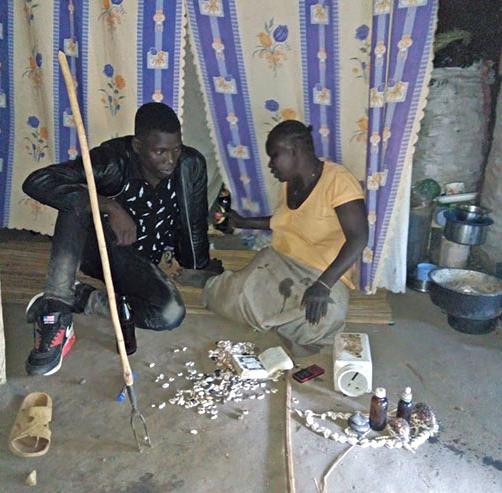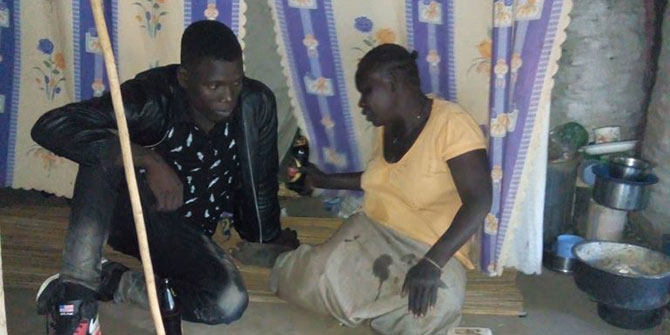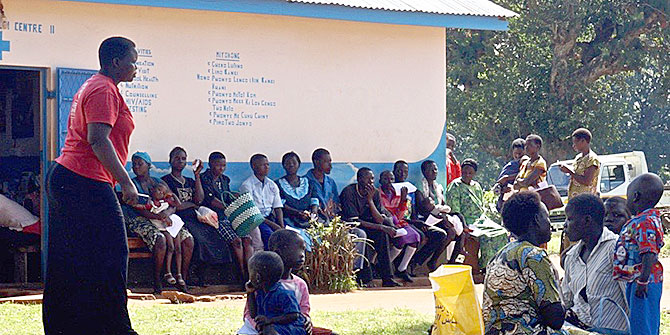In post-war contexts, especially where psychiatric support is limited, mental health practitioners should be culturally literate in identifying the needs of affected people and communities. The bias in Uganda towards Western medicines, says Robin Oryem, can prohibit effective treatments by healers and witch doctors, regardless of the science.
The civil war in northern Uganda between the Lord’s Resistance Army (LRA) and the Government has been one of the most brutal recent conflicts in Africa, characterised by rape, killing and mutilation of the civilian population. After more than two decades of the conflict, it comes as no surprise that mental illness rates in the country remain significantly high. Despite the best efforts of NGOs to heal these hidden wounds, a type of spiritual pollution called cen remains a significant mental illness affecting a large part of the population – associated with those who have been in contact with violence.
While recognising cen as a mental illness, mental health practitioners should become more culturally literate in this spiritual affliction. It is a failure of the international Diagnostic and Statistical Manual of Mental Disorders (DSM-5) to consider sufficiently cultural and self-limiting behaviours related to specific social settings, which may not be treatable by pharmaceutical interventions but can be treated by traditional healers.
To understand mental health interventions outside of Western medicine, I conducted a study in Acholi major towns in northern Uganda, in the districts of Pader, Gulu, Lamwo and Kitgum. Participants were two traditional healers, eight witch doctors, seven religious leaders, ten former LRA ex-combatants and twenty local community members, who talked to me about their perceptions of spiritual pollution. The conversations elucidated Acholi sense-making of mental illness and psychosocial suffering.
The research highlighted that cen is the most common mental health problem in the Acholi region. Spiritual pollution does not only affect ex-combatants but also civilians and school children. Yet, there is no biomedical means to treat what is deemed spiritual pollution. Out of the ten ex-combatant participants, eight were ‘disturbed by an evil spirit’, which caused them to display various signs of mental illness.
A 22-year-old man in Pader explained how he became ill:
‘I went to get some mangoes from the forest, I did not know that [in] that part of the forest people are not allowed to cross, when I reach that area I felt a very cold wind all over my body. Immediately I knew something was wrong but I continued picking mangoes, after few minutes I started hearing strange voices asking me why I was picking their mangoes without permission. I ran back home … the next day I was feeling fever and general body weakness, but from the second day I could not remember anything my mother said. I was mad and very aggressive beating everyone, pastor was called to pray for me and I came to my senses and found people surrounding me and my hand were tied. I asked people what was going on …’
Okello, a 40-year-old ex-combatant from a village not far from Kitgum district:
‘Before I became born again Christian, evil spirit could haunt me so much. There was a period where I could get scared if I heard any loud sound and most of the time I could see the spirit of the woman they forced me to kill when I was with the rebels.’
Okello also recounted a time when he hid himself inside his house until his brother took him to church, and the priest prayed for him. He reported this was the only way he could heal his illness.
The most common form of treatment is by seeking care from a religious leader or traditional healer, locally referred to as ajwaka. Seventeen of the local community members interviewed reported prayer or traditional healing as the method used to purify their spirit. Lapwony, a 56-year-old traditional healer and resident of Laroo division, told me how he healed a young boy who became spiritually polluted and went mad from bewitchment:
‘This boy was brought to me in a terrible state, he was eating his own feces, he could not recognise any of his family members and was very violent, when they brought him here I prayed and the spirit told me that he has been bewitch[ed] so I prayed for him and cast away the spirit that was send to him and he became fine as you can see him playing there … you cannot even imagine that he was once mad.’
In Akumu, a 35-year-old woman told me how she became a traditional healer, saying that she was in a fragile mental state when she started the profession. She reasoned that biomedical care would not have been able to treat her. She also explains the notion of jok – a class of spirit within the traditional Acholi belief system, which she believes to be hereditary, passed down to her from her traditional healer grandmother:
‘Jok wanted me to become a witch doctor when I resisted, I became mad for three months but in the fourth month I was taken from the forest to a Pentecostal church and I became a born again. The spirit left me but that liberty only lasted for two years and then I suffered the hardest attack yet from jok. I became mad for the second time and I lived in trees like monkey for three months, until my sister brought a witch doctor to initiate me into being a witch doctor, and after the initiation process I became well. So I don’t know how biomedicine would treat me.’

A 23-year-old witch doctor and a resident of Gulu town, Abalo, explains that her treatment works whether or not they are scientifically proven. She says she cooperates with biomedical and formal healthcare providers in her catchment area:
‘I do heal many people from mental illness and this year, 2018, I healed 12 people who were mad and I referred one to be taken to the hospital since I found out that her cause of her madness was not as a result of the evil spirit cen.’
Further, to heal a lady with mental health challenges, a religious healer pastor shouted at a woman who rolled on the ground:
‘Get out, out you evil spirit, you spirit out madness get out of her in the name of Jesus.’
After ten minutes of prayers the lady stopped rolling and acting ‘like a mad woman’. The pastor explained that he had healed her:
‘There are spirit[s] of madness and if that spirit is sent to you by a witch doctor then you will become mad … pharmaceutical medicine can just worsen your situation. The best way to fight a spirit is through the use of spirit.’
In the Acholi region of northern Uganda, we must accept that mental illness cannot always be treated or managed by conventional medicine. The Ugandan government faces challenges of a weak referral system, skilled staff shortages and stock shortages of pharmaceuticals in its provision. Anthropologists could be used to explore the synergies and differences between biomedical treatments and those available outside of psychiatry, by witchdoctors, pastors and traditional healers, in ways that are culturally appropriate should they work.
Please click here for Africa at LSE’s two-part series on the anthropology behind ‘trauma’ in war-affected and post-conflict settings.
Photo: Mukono market, Uganda by Andrew Itaga on Unsplash.






This is an amazing research topic and hav got to learn alot about the joks (cen) which scientifically not proven but exist in real life
You are right dear we need integrate the components together to make work well